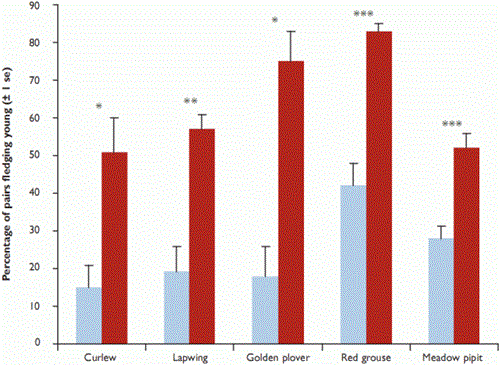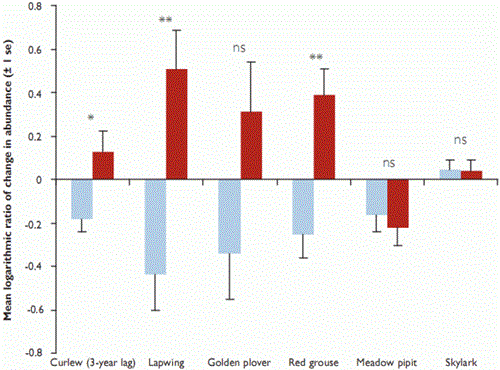Gamekeepers are conservationists
My column in the Times on 11th August:
Tomorrow sees the start of the red grouse shooting
season, a sport under attack as never before, with a petition to
ban it, and campaigns to get supermarkets to stop selling grouse
meat.
As somebody who lives in the rural north and knows the issue at
first hand, I am in no doubt that the opponents of grouse shooting
have it backwards. On both economic and ecological grounds, the
shooting of grouse is the best conservation practice for the
heathery hills of Britain. If it were to cease, most
conservationists agree that not only would curlews, lapwings and
golden plover become much scarcer, even locally extinct, but much
heather moorland would be lost to forest, bracken, overgrazing or
wind farms.
Be in no doubt: management for grouse is conservation. The
owners spend money to maintain the heather moors that constitute an
ecosystem found almost nowhere other than Britain. They prevent
overgrazing, re-establish heather, remove plantations of non-native
sitka spruce, eradicate bracken, manage drainage, periodically burn
long heather, kill foxes and crows, refuse to build subsidised wind
farms, and thus maintain the great open spaces of the Pennines and
parts of Scotland where people are free to walk. In the past decade
alone, moorland owners have regenerated 57,000 acres of
heather.
More than £50 million is spent on conservation by grouse moor
owners every year. That’s roughly twice as much as the Royal
Society for the Protection of Birds devotes to its entire
conservation efforts. There is no way the taxpayer would or should
stump up that kind of cash to look after heather moors. But
somebody has to: there is no such thing as a natural ecosystem in
this country and conservation requires human intervention.
Grouse moor owners recoup some of their costs by leasing
shooting to wealthy clients, who often fly in from abroad, fill the
local hotels and create crucial local employment. In the economy of
many Pennine dales, grouse shooting is irreplaceable, adding more
than £15 million a year nationally and supporting 1,500 full-time
jobs. It redistributes money from hedge-fund managers in the south
and overseas to some of the poorest parts of rural Britain. Much as
you might wish them to, rich folk won’t spend lots of money in the
Pennines to watch rare birds; but they will to shoot grouse.
Astoundingly, golden plover, curlews and lapwings, the three
most iconic wading birds of the uplands, live at five times the
density and have more than three times the breeding success on
moors with gamekeepers compared with moors without gamekeepers.
That this is because of gamekeeping was confirmed in a series of experiments by the
Game and Wildlife Conservation Trust near Otterburn in which
matching areas of moor were either keepered or not, then swapped
around after four years.
These birds would be at risk of dying out if it were not for
gamekeepers, as would black grouse, ring ouzels and merlins.
Nesting on or near the ground, such birds are vulnerable to foxes
and crows that take their young. With unnaturally high numbers of
foxes and crows in Britain — because of human roadkill and garbage
— the only way the birds can thrive is if somebody controls the
numbers of crows and foxes. The RSPB knows this and kills both
species on some of its reserves.
As a result, grouse moors in spring are alive with the calls of
birds, whereas the moors that are not managed for grouse are
ornithological deserts. In Wales, for example, lots of conservation
bodies try to manage the hills for birds, but curlews and golden
plover are very scarce, black grouse non-existent — in sharp
contrast to the grouse-rich Pennines. One grouse moor owner I spoke
to last week said he was happy to challenge the RSPB to an
ornithological audit by a neutral body of its upland reserves
versus his grouse moor.
The RSPB argues that the hen harrier, a hawk that preys on
grouse and breeds on moors, is under threat of extinction, because
gamekeepers persecute it. Yesterday saw a damp day of protest on
its behalf. In fact the British hen harrier population is stable at
about 630 pairs and is much higher than it was 100 years ago when
these birds were confined mainly to islands like the Orkneys.
Most of them are in Scotland. The only three successful pairs in
England this year were on or next to managed grouse moors. They are
not breeding on the RSPB’s English reserves because they too are
vulnerable to fox predation, so they need gamekeepers as much as
curlews do. On a Pennine grouse moor there is ample food — grouse
and other birds. On a Welsh bird reserve there’s just the odd
meadow pipit to eat. Because hen harriers breed in colonies, as a
1990s experiment at Langholm in Scotland found, they can quickly
build up (to 20 pairs in that case) and destroy the economy and
jobs on the grouse moor. The harriers themselves would then
collapse in numbers for lack of food. By the end of the experiment,
hen harriers at Langholm were back to two pairs.
You can see why gamekeepers dislike the idea of being done out
of a job by a bird that cannot thrive without their protection;
little wonder that some must occasionally be tempted to deter or
even kill harriers. A sensible compromise is on the table, and moor
owners are ready to sign up to it: they would allow low densities
of harriers on grouse moors, removing the excess chicks to
repopulate Wales or Cornwall, and providing “diversionary feeding”.
Everybody gains. All that’s needed is the RSPB’s agreement, but it
is being obdurate and demanding unworkable preconditions.
The red grouse, the bird at the heart of all this, is an amazing
creature. It’s wholly dependent on grazing heather, it cannot
survive in captivity, it lures people to invest heavily in
conservation in the north, which supports the economy and benefits
other wildlife, and it’s found nowhere else in the world — unlike
the hen harrier, which is common across two continents. The grouse
population can be heavily cropped, just like sheep, to provide
fine, free-range meat.
The campaign against grouse shooting makes no ecological or
economic sense. Surely it is not a cynical attempt to raid urban
wallets with an emotive anti-rich campaign like the RSPCA’s
campaign against foxhunting? Surely not.
-----
Post script: The data on the effect of gamekeepers on the
breeding success of round nesting birds are truly striking. In the
charts below, the red bars are with gamekeeping, the blue bars
without. (Source: here)

This chart shows the change in abundance as a result of the
introduction of gamekeeping:

Matt Ridley's Blog
- Matt Ridley's profile
- 2180 followers



